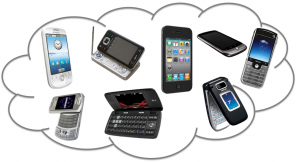 Over on TechCrunch late last week, the co-founder and CEO of voice-application startup SayNow, Nikhyl Singhal
Over on TechCrunch late last week, the co-founder and CEO of voice-application startup SayNow, Nikhyl Singhal , wrote a very interesting post titled Phone Numbers Are Dead, They Just Don’t Know It Yet. The idea behind the post is that with the development of resources like Skype and Google Voice, telephone numbers are dying a slow death. With the growing mainstream acceptance of online communication tools, will we be facing a time in the not-so-distant future where telephone numbers will be obsolete? There is a very real possibility of this. Don’t believe it? Check out some of the main reasons Singhal cites to qualify this theory:
, wrote a very interesting post titled Phone Numbers Are Dead, They Just Don’t Know It Yet. The idea behind the post is that with the development of resources like Skype and Google Voice, telephone numbers are dying a slow death. With the growing mainstream acceptance of online communication tools, will we be facing a time in the not-so-distant future where telephone numbers will be obsolete? There is a very real possibility of this. Don’t believe it? Check out some of the main reasons Singhal cites to qualify this theory:
- No control. Anyone can dial your 10 digits, including your ex-girlfriend, a political campaign worker, or a solicitor. Unlisted numbers, Caller ID and do-not-call lists all tried to solve this problem, but these solutions still don’t prevent unwanted calls.
- Phone numbers are tied to a device, not to you. Everyone has multiple numbers, yet your home line is shared, leaving callers guessing the best way to reach you.
- User experience is very limited. The phone was designed as a utility—dial a number, have a conversation. It’s remained this way since its inception. It’s not optimized for other experiences, which is why voicemail and conference calls are tedious, and why checking flight status is worse than a root canal.
Everyone has been talking ad nauseam lately about “the cloud”, and the concept behind cloud computing is to allow access from virtually anywhere to one’s online tools, social networks, data, and files. In Pew Research Center’s most recent Future of the Internet survey, 71% of respondents agreed with this statement:
“By 2020, most people won’t do their work with software running on a general-purpose PC. Instead, they will work in Internet-based applications such as Google Docs, and in applications run from smartphones. Aspiring application developers will develop for smartphone vendors and companies that provide Internet-based applications, because most innovative work will be done in that domain, instead of designing applications that run on a PC operating system.”
By the way, this has been a topic of discussion for quite some time now. And it’s been going on all over the world, too. And there are already a ton of communication tools that facilitate this change. Just consider all of the current smartphone apps that allow you to make and receive calls and messages without using mobile minutes – Skype, Foo Call, Video Call, Vonage Mobile, and many other VoIP apps that work on numerous smartphones and also have desktop services.
As sourcing and/or recruiting professionals, what is this going to possibly do to our telephone sourcing activities? Already, we’ve seen our ability to determine someone’s current location by area code decrease significantly. Case in point: me! I know I’ve confused many of you already with the fact that I have a work phone number with a NYC area code, a mobile phone number with a Cincinnati area code, and yet I now live in Washington state. Heck, it confuses ME at times!
As point #1 above states, we currently have access to pretty much anyone via a phone number. So, what happens if/when communication methods move to the cloud, and we have to get permission from a potential lead just to “call” them? This opens up a whole different discussion around sharing relevant content, appropriate and timely messaging, and relationship development.
Look – I know it is unwise to make sweeping statements. And I also know that technology advances like this certainly won’t have a 100% adoption rate. But there is no denying that these changes WILL affect the ease with which we can reach people. Ignoring that fact will put you in the same category as the guy who said, “There is no reason anyone would want a computer in their home.” That guy was Ken Olson, CEO and co-founder Digital Equipment Corporation (DEC), a leading vendor in the minicomputer market throughout the 1960s and 1970s. He said this in 1977.
I am not a telephone sourcer, so I realize that I am not speaking on this topic as a practitioner. But I am quite interested in how others feel about this. So I’d really like to hear from those of you who are engaged in telephone sourcing. Just consider the “what if?” aspect of this situation and tell us what you think, because a lot of us here agree that this is a very real possibility, and we need to start thinking about how this can, and will, affect our telephone activities.
In the meantime, an appropriate tune from New Edition for you – enjoy!
http://video.google.com/videoplay?docid=-4125115404679942172#